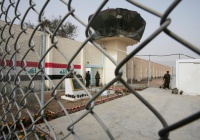Home » Iraq » IRQ - News » Iraq: Disappearance of Maan Al Samarrai from Abu Ghraib Prison since July 2013
Al Samarrai was arrested on 13 July 2008 by members of the Al Muthanna Brigade of the Iraqi army during a search in the Faculty of Agriculture in Baghdad, where he used to study. He was allegedly arrested for carrying two ID cards.
After his arrest, Al Samarrai was then brought to the Baghdad Central Prison – formerly known as Abu Ghraib prison, where his mother was able to visit him on a regular basis until 23 July 2013.
That day, hundreds of convicts escaped, but Al Samarrai's mother believed her son was among the remaining prisoners and was transferred to another unknown detention centre.
In fact, Al Samarrai's brother, who had been detained since 2007 and is now free, reports he last saw him on 17 June 2015 in Nasiriya prison where they were detained together. On 15 December 2015, Al Samarrai's mother also was told that her son was detained in Baghdad airport prison. She therefore inquired at that prison in early 2016, but the authorities refused to provide her with any information on his fate and whereabouts.
In view of these facts, the two human rights organisations seized the UN Committee on Enforced Disappearances (CED), asking it to call upon the Iraqi authorities to disclose Al Samarrai's whereabouts and allow his family to visit him.
Concerned over the widespread practice of enforced disappearance in Iraq, Alkarama recalls that it is essential that the Iraqi authorities urgently implement the recommendations issued by the CED in September 2015, and in particular that they ensure that all persons who were forcibly disappeared and whose fate is not yet known are searched for and located without delay.
For more information or an interview, please contact This email address is being protected from spambots. You need JavaScript enabled to view it. (Dir: +41 22 734 1008).
 Algeria
Algeria Bahrain
Bahrain Djibouti
Djibouti Egypt
Egypt Iraq
Iraq Palestine/Israel
Palestine/Israel Jordan
Jordan Kuwait
Kuwait Lebanon
Lebanon Libya
Libya Mauritania
Mauritania Morocco
Morocco Oman
Oman Qatar
Qatar Saudi Arabia
Saudi Arabia Sudan
Sudan Syria
Syria Tunisia
Tunisia United Arab Emirates
United Arab Emirates Yemen
Yemen Other Countries
Other Countries







